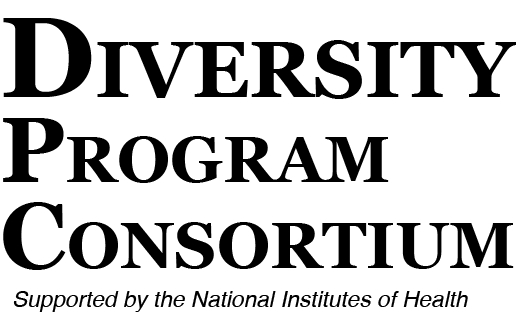



The Diversity Program Consortium is a trans-NIH program that aims to engage a more diverse field of individuals in biomedical research careers. The impetus for this initiative traces back to a 2011 NIH-commissioned study that identified gaps in NIH funding success rates for Black researchers specifically.1 The study found that Black Ph.D. scientists’ chance of being awarded NIH funding was 10 percentage points lower than of White scientists—even after accounting for the applicant’s educational background, country of origin, training, previous research awards, publication record, and employer characteristics. Another study followed in 2019 finding topic choice—a previously unstudied aspect of the review process—as a key contributor for this funding disparity.2 Black scientists tended to propose research at the community and population level, exploring topics such as health disparities. These topic areas received poorer scores from application reviewers, whereas more fundamental and mechanistic investigations received higher award rates. After controlling for the applicant's prior achievements and multiple other variables, the study found that topic choice alone accounts for over 20 percent of the gap in award funding.
As we continue our work to support diversity in biomedical research, it is important to remember that the 2011 study uncovered a significant disparity in funding for Black and African American scientists. The biomedical research community has an opportunity to center Black scientists, researchers, and students, so that efforts for diversity are equitable. By elevating Black students, faculty, and institutions, we elevate all students, faculty, and institutions. As officials from the National Institute of General Medical Sciences stated in a recent NIGMS Feedback Loop blog post:3
“Our commitment to a diverse workforce can’t be realized until our Black students, postdocs, and colleagues have the same opportunities to enter and advance within the biomedical research community as anyone else.”
Efforts to increase equity and diversity in biomedical science must be informed by anti-racism. Anti-racism recognizes that racism is systemic/institutional, interpersonal and internalized,4 and that combatting racism involves functions such as reducing the incidence of racist practices, fostering a non-racist culture, supporting the victims of racism, empowering racialized subjects, and transforming racist relations into better relations.5
The following are anti-racist resources compiled for the DPC community and others who work towards inclusive excellence in the biomedical sciences. This page will be maintained and updated by the Coordination & Evaluation Center. Suggestions are welcome, please email info@diversityprogramconsortium.org.
Sources:
1 https://www.ncbi.nlm.nih.gov/pmc/articles/PMC3412416/
2 https://advances.sciencemag.org/content/5/10/eaaw7238
3 https://loop.nigms.nih.gov/2020/06/what-can-we-do-to-combat-anti-black-racism-in-the-biomedical-research-enterprise/
4 Berman, G., & Paradies, Y. (2010). Racism, disadvantage and multiculturalism: Towards effective anti-racist praxis. Ethnic and Racial Studies, 33(2), 214-232. doi:10.1080/01419870802302272
5 Hage, G. (2016). Recalling anti-racism. Ethnic and Racial Studies, 39(1), 123-133. doi:10.1080/01419870.2016.1096412
Tell Your Story to Help Track Hate
Stop AAPI Hate - Report Hate Incidents
Treating Yellow Peril: Resources to Address Coronavirus Racism
Asian American Racial Justice Toolkit
Cornell University Anti-Racism Resources for the AAPI Community
Asian American Advancing Justice Resources to Stand Against Racism
AAPI Women Lead
LGBTQ AAPI Resources
National Asian Pacific Center on Aging
Asian Pacific Heritage Month Information from the Library of Congress
Cultural Determinants of Design
Implicit Bias Video Series & more
Dad explains in viral post why he won’t walk alone in his neighborhood: ‘This is my reality’
National Museum of African American History and Culture – Talking About Race resource page
National Museum of African American History and Culture – Being-antiracist
UCLA Department of Medicine Grand Rounds Webinar: Race, Racism and Health with Keith Norris (MD, PhD), Christina Harris (MD), Teresa Seeman (PhD)
Particles for Justice – Resources
#ShutDownSTEM Resources by Stage
Test Yourself for Hidden Bias—Implicit Association Test
The BIPOC Project: A Black, Indigenous, & People of Color Movement
Anti-racism Digital Library and Thesaurus
University of Iowa Libraries—Anti-racism: General Resources
Do The Work: An Anti-Racist Reading List
‘1619’ Podcast by The New York Times
Association of Asian Pacific Community Health Organizations Mental Health and Substance Abuse Resource
Guide to Providing Mental Health Services to Immigrants Impacted by Changes to DACA and the COVID-19 Pandemic
Care for Your Coronavirus Activity
Racism and Psychological and Emotional Injury: Recognizing and Assessing Race-Based Traumatic Stress
Surviving and Resisting Hate – A Toolkit for People of Color
Therapy for Black Girls Podcast
#ShutDownSTEM Resources for Healing
Mindfulness for the People: Radically Re-Imagining the Mindfulness Movement
The Trevor Project: Supporting Black LGBTQ Youth Mental Health
Community Healing Network: Family-Care, Community-Care and Self-Care Toolkit
UCLA Equity, Diversity and Inclusion: Resources for Racial Trauma
Academics for Black Survival and Wellness
NAMI's "Ask the Expert" Webinar: Impact of Racism and Trauma on Black Mental Health
NAMI—Strength Over Silence: Stories Of Courage, Culture And Community
NIGMS Feedback Loop Blog post: What Can We Do to Combat Anti-Black Racism in the Biomedical Research Enterprise?
Building Evidence: Racial Disparities in NIH Funding
The Carter Lab at NIH: A Model of Inclusive Excellence in Biomedical Research
The Atlantic: The Disciplines Where No Black People Earn Ph.D.s
The Time is Now: Systemic Changes to Increase African Americans with Bachelor’s Degrees in Physics and Astronomy (American Institute of Physics)
Research: Decoupling of the minority PhD talent pool and assistant professor hiring in medical school basic science departments in the US
Disarming Racial Microaggressions: Microintervention Strategies for Targets, White Allies, and Bystanders
Whose culture has capital? A critical race theory discussion of community cultural wealth
Impostor Phenomenon and Mental Health: The Influence of Racial Discrimination and Gender
Language Matters: Considering Microaggressions in Science
The Influence of Affirming Kindness and Community on Broadening Participation in STEM Career Pathways
Historically White Universities and Plantation Politics: Anti-Blackness and Higher Education in the Black Lives Matter Era
The Diversity-Innovation Paradox in Science
To Be Young, A Doctor And Black: Overcoming Racial Barriers In Medical Training
The Diversity–Innovation Paradox in Science
Genes to Genomes: Understanding our eugenic past to take steps towards scientific accountability
BMJ Opinion: We have to teach doctors about injustice
Racism and Psychological and Emotional Injury: Recognizing and Assessing Race-Based Traumatic Stress Wellness
Racial Equity in Online Environments Webinar Series—USC Center for Urban Education
Race Talk: Engaging Young People in Conversation about Race and Racism
Affirming Black Lives Without Inducing Trauma
Center for Organizational Responsibility and Advancement (CORA) – Learn to Teach People of Color
CORA Webinar: Employing Equity-Minded & Culturally-Affirming Teaching Practices in Virtual Learning Communities
YouTube: Culturally Aware Mentorship with Dr. Sherilynn Black and Dr. Angela Byars-Winston
The Science of Effective Mentoring in STEMM
DPC Webinar Recording: The Science of Effective Mentoring in STEMM– Highlights from recent National Academies Press Report
KQED MindShift—How Ibram X. Kendi's Definition of Antiracism Applies to Schools
Institutional Barriers, Strategies, and Benefits to Increasing the Representation of Women and Men of Color in the Professoriate
NIGMS Training – Programs by Academic Stage
NIGMS Diversity Supplement Program
Undoing Racism: The People's Institute for Survival and Beyond
African American Policy Forum
Funders' Learning Community—Resources about racial gaps in research funding
Disclaimer: NIGMS does not endorse or recommend any commercial products, processes, or services. Some documents on this site may provide links to other Internet sites only for the convenience of World Wide Web users. NIGMS is not responsible for the availability or content of these external sites, nor does NIGMS endorse, warrant, or guarantee the products, services, or information described or offered at these other Internet sites.